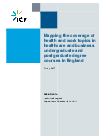 Things you might remember...
Things you might remember...You are invited to attend this public event in partnership with The Progress Educational Trust (PET). Life after Death: A woman's victory in having her deceased husband's children Tuesday, 24 October 2017, 6pm drinks reception, 6.30-8pm discussion. Lecture Theatre 4, Arts Tower, Western Bank, S10 2TN.
20 years ago, widow Diane Blood won the legal right to conceive a child using the sperm of her deceased husband Stephen Blood. This free event will bring together some of the people at the centre of this landmark legal case - including Diane herself and her son Liam. Two decades on from Diane's legal victory the speaker panel will look back on personal, legal, medical and ethical aspects of the case. They will also consider the impact of the case on others who have sought to use a person's sperm, egg or embryo to conceive a child after that person has died. Why do such scenarios still lead to legal difficulties and provoke public debate, in the UK and elsewhere? Attendance at this event is free, but advance booking is required
 Things about CAMHS...
Things about CAMHS...New research from the Royal College of Psychiatrists shows there are huge differences in CCG spending across the country. Their online tool can help you find out how much is spent on child and adolescent mental health services in each region.
Things about measuring...
 A report published this week by Public Health England 'National child measurement programme (NCMP): trends in child BMI' uses NCMP data to examine the changes in children’s body mass index (BMI) between 2006 to 2007 and 2015 to 2016.
A report published this week by Public Health England 'National child measurement programme (NCMP): trends in child BMI' uses NCMP data to examine the changes in children’s body mass index (BMI) between 2006 to 2007 and 2015 to 2016.Things about the future of health...
 This report 'Future of health' presents findings from a survey conducted by RAND Europe at the request of the National Institute for Health Research (NIHR) to gather and synthesise stakeholder views on the future of health and healthcare in England in 20 to 30 years' time. The aim of the research was to generate an evidenced-based picture of the future health and healthcare needs, and how it might differ from today, in order to inform strategic discussions about the future priorities of the NIHR and the health and social care research communities more broadly.
This report 'Future of health' presents findings from a survey conducted by RAND Europe at the request of the National Institute for Health Research (NIHR) to gather and synthesise stakeholder views on the future of health and healthcare in England in 20 to 30 years' time. The aim of the research was to generate an evidenced-based picture of the future health and healthcare needs, and how it might differ from today, in order to inform strategic discussions about the future priorities of the NIHR and the health and social care research communities more broadly.The survey provided a rich and varied dataset based on responses from 300 stakeholders in total. A wide range of fields were represented, including public health, social care, primary care, cancer, genomics, mental health, geriatrics, child health, patient advocacy and health policy. The respondent group also included a number of professional and private stakeholder categories, such as clinicians, policy experts, academics and patient and public representatives.
The study findings validate a number of prominent health research priorities currently visible in England, such as antimicrobial resistance, the burden of dementia and age-related multi-morbidity, digital health and genomics. Interest in these areas and other themes, such as mental health, health inequalities and transforming health service models, cut across multiple disciplinary boundaries. However, it is clear that there are a variety of views among stakeholders on the relative importance of these areas of focus, and the best approach to manage their emergence in the coming decades.
The full dataset of survey responses, for which permission to share was given, has been published alongside the report and is a useful resource for those seeking to engage with a particular issue in more depth.
Things magical...
 Calling witches, fairies, wizards, nifflers, fairy godmothers, elves, magicians and magical creatures of all ages! Hop on your broomsticks, flying carpets or dragons and join 'Off the Shelf' on The Moor for a spellbinding afternoon celebrating magical books of all kinds. Sat 7th October 1:00pm - 4:00 pm
Calling witches, fairies, wizards, nifflers, fairy godmothers, elves, magicians and magical creatures of all ages! Hop on your broomsticks, flying carpets or dragons and join 'Off the Shelf' on The Moor for a spellbinding afternoon celebrating magical books of all kinds. Sat 7th October 1:00pm - 4:00 pmFrom Room on the Broom to The Wizard of Oz, and from The Worst Witch to Lord of the Rings – we all love magical fiction. And 2017 marks 20 years of the boy wizard Harry Potter!
Visit Grimm & Co’s mysterious dark den, jam-packed with magical things to see and do. There will be lots of fun arts and crafts activities including storytelling, takeaway spells and potion-making. You can make a dragon puppet to take home and train, play an enchanted glass harp, write your own mini-book, create a potion, make your own wand with a certificate of authenticity and much more. Watch out for wizards, witches and real magicians – you might even spot Hagrid…
Come dressed as your favourite magical character or creature and join the fancy dress parade at 3pm.
To continue the fun, a very magical film will be screening at 4pm at The Light Cinema. Visit sheffield.lightcinemas.co.uk for details. Suitable for all ages, children must be accompanied by an adult.
Things to eat...
 If you have a courgette glut - or even if you haven't - here is a nice vegetarian risotto to try Courgette and lemon. Although to my mind every good risotto should have a splash of wine in it before you start adding the stock.
If you have a courgette glut - or even if you haven't - here is a nice vegetarian risotto to try Courgette and lemon. Although to my mind every good risotto should have a splash of wine in it before you start adding the stock.





















